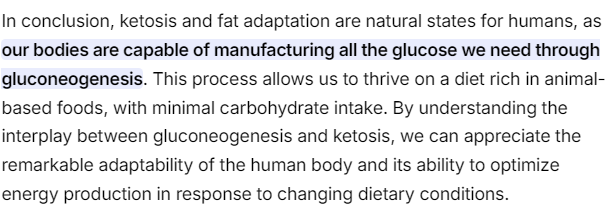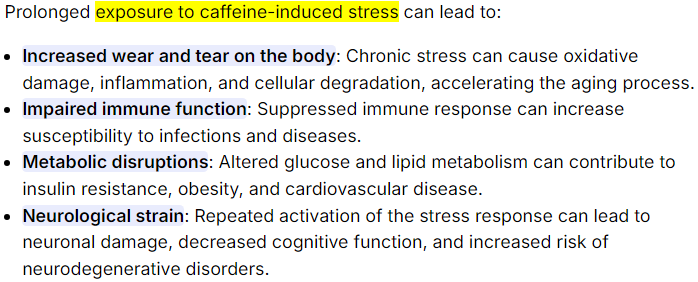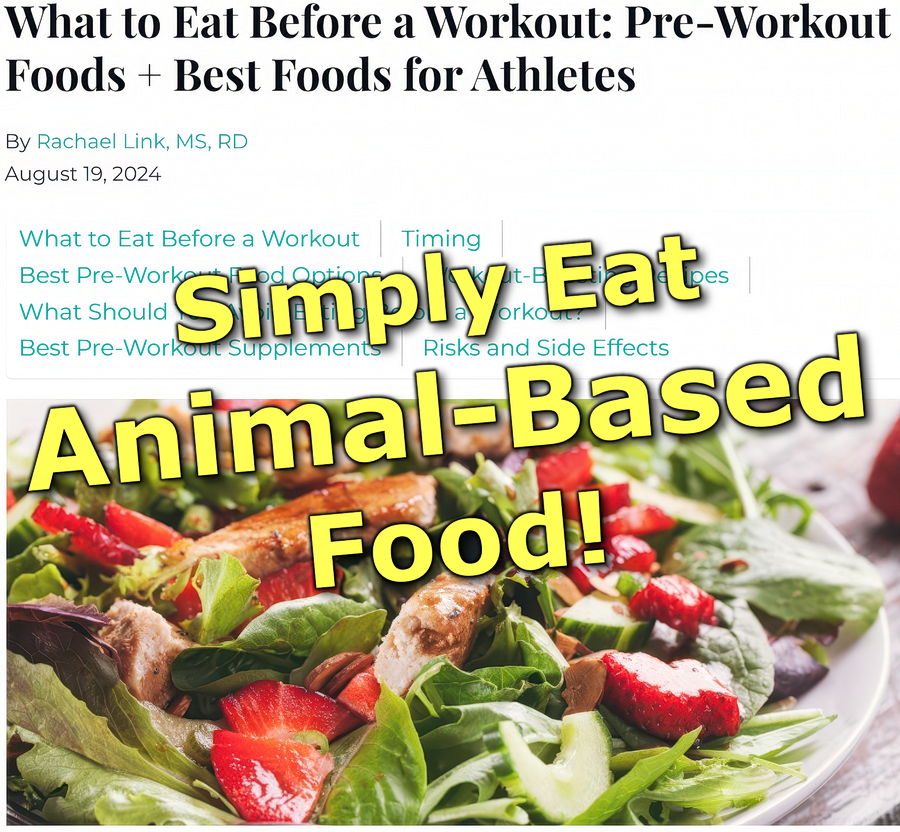Today we revisit the shill Dr. Axe and his staff’s latest attempt to write an article about ‘workout nutrition’ and food for athletes. On June 23, I reviewed a similar article from Healthline, which was, well, really bad. Let’s see how this ‘Rachael Link’ does, and I’ll add my thoughts from working at the absolute elite-level in this field for more than 20 years.
“It’s no secret that hitting the gym is important when it comes to gaining muscle mass and improving performance, but if you’re not paying attention to what you’re putting on your plate, it can be nearly impossible to make any progress, even with the most rigorous gym routine. While filling up on junk and ultra-processed foods can definitely hinder your performance, including a few of the best pre-workout foods in your diet can help amp up fat burning and support muscle growth.”
You will only struggle with results if you have nutrient deficiencies, as in not consuming enough animal-based food, the only source of bioavailable nutrients for humans, and/or if your body is very toxic from consuming plant-based and processed foods and getting exposed to a lot of environmental toxins.
What to Eat Before a Workout
“The key to a successful workout begins with proper nutrition. The primary goal of a pre-workout meal is to replenish glycogen stores, which provide the energy needed for exercise.
Carbohydrates: Carbs are your body’s primary source of energy. When you consume carbs, your body converts them into glucose, which is stored in your muscles as glycogen. During exercise, your body taps in to these glycogen stores for fuel, making carbs essential for maintaining energy levels.”
No, carbohydrates are not our primary source of energy, you idiot! Fat is our primary source of energy, and during more intense activity, it is glucose, which our bodies can make on its own if you’re healthy.

If you are an unhealthy carbohydrate-junky, this might be true as you have damaged your body’s ability to manufacture its own glucose through gluconeogenesis. As glucose is extremely damaging to blood vessels and soft tissues, it must be kept at stable neutral levels at all times (the levels usually maintained by gluconeogenesis.) So every time you consume carbohydrates, which increases blood glucose, your body’s priority is to lower blood glucose back to normal as quickly as possible to limit the damage being done. This process involves using glucose as fuel (if possible,) then storing it as glycogen, and when the poor cells are oversaturated and will take damage, the rest is stored as body fat.
This means that if your body is used to getting carbohydrates and clearing up your mess on a regular basis, gluconeogenesis is pretty much shut down, and to quickly refill your glycogen stores consuming more carbohydrates is the simplest way. And keep in mind that almost everyone has been deceived into consuming carbohydrates, so pretty much everyone that takes part in studies has a damaged metabolism, running on exogenous carbohydrates instead of our natural fat metabolism. Also, someone who is used to carbohydrates might need 6 to 12 weeks on a ketogenic diet (totally without carbohydrates) before they become somewhat fat adapted and can use fat efficiently as fuel again — and it can take 5 to 6 weeks without carbohydrates before gluconeogenesis is working efficiently again. So, when you transition from an unhealthy and highly damaging diet with carbohydrates to our natural animal-based and ketogenic diet, it can take 12 weeks or more for your performance to recover and surpass your previous levels.


And this is why studies show improvements when consuming carbohydrates, because those who do not and have a damaged metabolism will suffer for a long time before they get better.
Now, those who follow our natural way of eating, as in a ketogenic approach, where we rely on fat for fuel, we can manufacture all the glucose we ever need — which also means that glycogen stores will be filled just as quickly as if you were consuming carbohydrates. Actually, our bodies can produce its own glucose a lot quicker than you can absorb it by consuming carbohydrates. That means that you have much more energy available and a much higher performance threshold at any given time when you are fully fat adapted and run on fats and ketones. As an athlete, that means that you will outperform anyone who relies on toxic carbohydrates.


So, no, if you’re healthy and follow our natural proper diet of animal-based foods, preferably fully carnivore, you will never need to worry about glycogen.
“Protein: Protein supports muscle repair and growth. Consuming protein before a workout provides your muscles with the amino acids needed to reduce muscle breakdown and promote recovery.”
Yes, at least you got that part right. However, we have an “amino acid pool” of approximately 100g of free amino acids available in cells, tissues, and bloodstream. As long as you have one big meal with plenty of animal protein a day, you will be pretty safe. However, if your goal is to build muscle mass, I do recommend three or at least two meals a day, and preferably one meal as early as possible and before your workout.
“Fats: Healthy fats are a slow-burning source of energy. While they aren’t the primary fuel source during high-intensity workouts, they can provide sustained energy during longer, moderate-intensity sessions.”
You do not “burn” an energy source. It provides energy that is used for metabolic processes, such as muscle contractions in this case. And sure, fat is primarily used during moderate to low intensity activities, while glucose is used in high-intensity scenarios — as in explosive movements or going close to maximum effort, like sprinting instead of a slow-paced jog. And remember, if you are fat adapted and healthy, you can manufacture all the glucose you’ll ever need.
Timing
“The timing of your pre-workout meal is just as important as what you eat.
Ideally, you should consume a meal two to three hours before exercising. This gives your body enough time to digest the food and convert it into usable energy.”
This depends on the size and composition of the meal. A small to medium-sized meal might be digested in three hours, but a large meal may take up to twice as long. However, if you are fully nourished and fat adapted, and you have had a meal within the last 24 hours, you will have all the energy you need anyways. Just make sure that you have time to digest the meal so your stomach is empty again, as you do not want your stomach working and using a lot of blood when you are about to exercise/lift weights.
“If you’re short on time and need a quick snack, aim to eat something light and easy to digest 30–60 minutes before your workout. Focus on carbohydrates with a small amount of protein, as these will be easier on your stomach and provide a quick energy boost.”
No, no toxic carbohydrates that mess up your metabolism. If you for some reason are short on time and want to gain muscle, simply take a slice of butter and perhaps a pinch of sea salt to enhance hydration. Also, in such situations, a natural unflavored isolate or hydrolyzed whey protein powder might be handy.
Best Pre-Workout Food Options
Due to time restrictions, I will only cover a few of these they listed. And don’t worry, all of them were completely idiotic and based on misinterpretation of the science and simply repeating the pseudoscience of the inverted field of “nutrition.”
“1. Beets (Nitric Oxide)
Whether you’re looking to enhance endurance or amp up athletic performance, beets are one of the best foods for athletes out there. Beets and beetroot juice are both loaded with nitrates, which can help improve the ability of the mitochondria to synthesize energy in the cells.”
You stupid, stupid, little girl. Anything from the plant kingdom is extremely toxic to humans. It does not matter if there is one compound that might have a “positive” effect, as they are all from acute poisoning and all these compounds will do damage to your body.
As for nitrates, when they enter the body, they will be reduced to nitrite, which can then be further reduced to nitric oxide (NO.) High levels of NO are extremely toxic to cells. Our body’s response is to upregulate energy production and use up this excessive and abnormal amount of NO. Sure, this might look like a “good” thing on a research paper, but your cells are being damaged!


Also, beets contain a shitload of the antinutrients oxalates and phytic acid, as well as the defense chemical betacyanins. These will do even more damage.
“2. Cordyceps (adaptogen, antioxidants)
Revered for its range of potent health-promoting properties, this type of medicinal mushroom may also be effective at increasing energy levels and speeding up muscle recovery to help take your workout to the next level. Cordyceps also top the charts as one of the best foods for athletes due to their antioxidant content.”
Antioxidants are simply defense chemicals — chemicals that are produced by the plant to deter, main, sterilize, and kill anyone who tries to eat them. You do not want to consume “antioxidants,” it’s a scam.




And as for Cordyceps, they are very high in these defense chemicals, and thus extremely toxic for humans. And if you understand anything about physiology and biology, you should know that anything that is classified as an “adaptogen” is very toxic. Adaptogens interfere with our healing and detoxing pathways, which is seen by their ability to lower inflammation (or body’s response to healing.) That is a very bad thing. While you might temporarily feel better as symptoms of the healing goes away, if healing is stopped, tissue damage will accumulate quicker and unchallenged, leading to severe complications down the road, such as cardiovascular disease and organ damage.

“9. Banana
Often referred to as nature’s energy bar, bananas are packed with simple carbohydrates and potassium, which helps maintain nerve and muscle function.”
It’s only sugar and a little bit of non-organic potassium. We already covered carbohydrates and how incredibly stupid it is to consume them. Leave the bananas to the chimpanzees and gorillas who actually have a larger colon that can be used for fermentation of rotten vegetable stuff.
For humans, bananas are extremely bad, and if you happen to eat something else close to consuming one, expect an upset stomach or even some diarrhea.
“10. Oats
Oats are a great source of slow-digesting carbohydrates, providing sustained energy throughout your workout. They’re also high in fiber, which can help keep you feeling full.”
The biggest scam of them all, and gullible idiots still fall for it. Oats are the ultimate slave food, the worst shit you can consume. I covered oats in depth in my article “Oats — One of the Most Toxic Slave Foods in History.”
Best Pre-Workout Supplements
“Caffeine: Caffeine is a well-known performance enhancer that can increase energy, focus and endurance. It can be consumed in the form of coffee, tea or pre-workout supplements.”
Caffeine is an extremely potent poison, a central nervous system stimulant, and neurotransmitter modulator. Caffeine will put your body into a fight-or-flight stress response. It will not only do tissue damage to your body, convince your brain that you are no longer tired, but it will also break down your entire body, especially the organs, through repeated artificial-induced stress. I covered this many times.



You will only feel that you need caffeine if you are addicted to it, or if your diet is complete shit, as in lacking in animal-based foods and you are deficient in one or more nutrients. And tricking your body into becoming alert and “energized” through artificially induced stress is not the answer. Fix your diet instead.
“Creatine: Creatine helps increase strength, power and muscle mass. It’s one of the most researched supplements and is commonly used by athletes and bodybuilders.”
Yes, and you will get plenty of creatine from eating meat, which you should do daily.
I covered creatine in depth in my article “Creatine is a Conditionally Essential Nutrient and Most People are Deficient.”
“Beta-Alanine: This amino acid helps reduce muscle fatigue and improve endurance, making it beneficial for high-intensity workouts.”
Beta-alanine is a non-essential amino acid, meaning that the human body can synthesize it from other amino acids, such as histidine, rather than obtaining it solely from dietary sources. Beta-alanine plays a crucial role in the production of carnosine, a dipeptide molecule composed of beta-alanine and histidine. Carnosine is stored in skeletal muscles and acts as a buffer against lactic acid accumulation during high-intensity exercise. When muscles contract, they produce lactic acid as a byproduct of anaerobic metabolism. Carnosine helps to neutralize this excess lactic acid, delaying the onset of fatigue and improving exercise performance.
So, as long as you get plenty of both beta-alanine and histidine, you’ll be perfectly fine. And yes, you get more than you need if you follow an animal-based diet.
Oversaturating your cells with beta-alanine through supplementation might give an extra “boost,” but you also need to consider the contaminants in such supplements as amino acids are not as tightly regulated as chemicals such as fake vitamins or drugs, and each manufacturer can have their own specific process.
“Branched-Chain Amino Acids (BCAAs): BCAAs can help reduce muscle breakdown during exercise and promote muscle recovery post-workout.”
Yes, BCAAs, particularly leucine, promote the building of protein in muscle tissue while decreasing muscle damage and breakdown from exercise. And as with beta-alanine, you’ll have to consider the manufacturing process, especially since BCAA is composed of three different amino-acids, which all three might be sourced from different processes. Usually, they are sourced from fermented plant extracts or synthetic amino acids. Both are bad and will not have the same bioavailability as BCAA’s found in animal-products such as meat, eggs or raw milk.
Then, of course, the raw materials are purified through various methods, including chromatography, filtration, and crystallization — each step leaving toxic residues and challenging the integrity of these amino acids.
And that was all I had time for this morning as my internet connection was out all morning due to maintenance work by the network supplier company. Thus, my usual time for writing was pretty much cut in half.
If you found the article and my insights helpful and enjoy my free information, please consider donating to help pay the webhosting bills and keep the site running. And if you’re interested in discussing and sharing information with likeminded people, consider joining our uncensored community at Ungovernable.se. Thank you!

